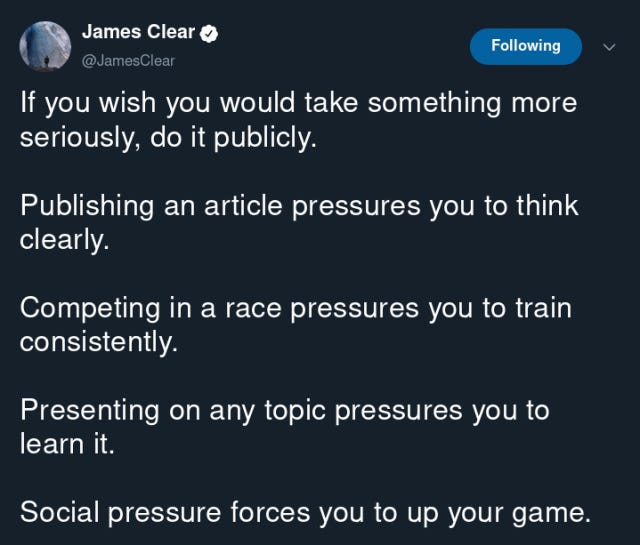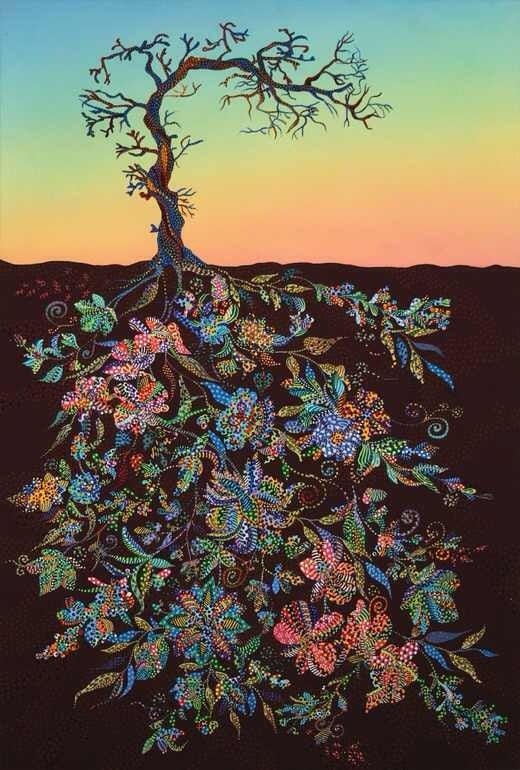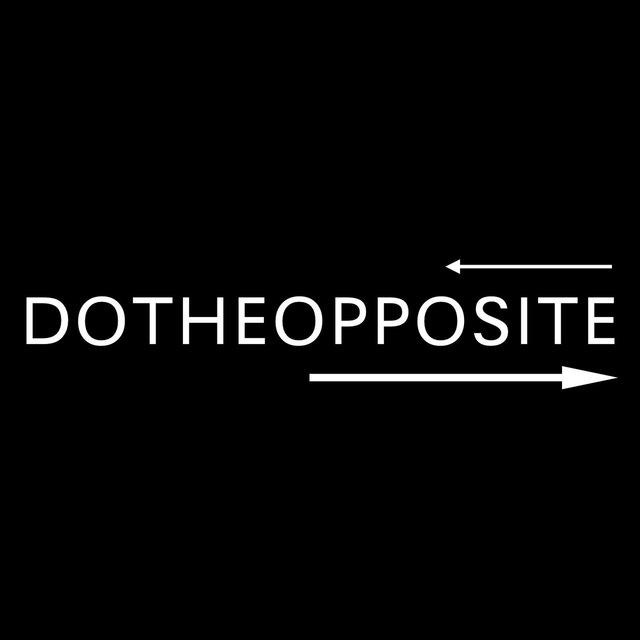Do the Opposite - What Do You Really Need To Start, Negative People, One Pushup
Hello friends,
Welcome to the newest issue of the Do the Opposite newsletter, sent every Monday! If you like it, please forward this email to your friends or share this link with them: tinyletter.com/dotheopposite - this helps the newsletter grow!
If you want to share any resources, articles, books or anything else with the community, please reply to this email with your recommendations!
_________
What Do You Really Need to Start?
I've recently been considering this. Ever since I've signed up for some races in September and October, I've started running almost every day to train for them. At first, I thought: oh, I need to get new running shoes, a special belt to carry water in as I run, a running cap to protect me from the Sun, etc. etc.
However, all of these considerations were in my mind only before I actually started running. Once I've started, I didn't care as much about them anymore. Yes, eventually I will get some of these items, but they don't stop me from starting. That's the most important part.
From my conversations with people ever since I've noticed that a lot of people make the same mistake I did: they think they need to do massive research, find the best equipment, read up on all the possible injuries and issues that come up (if talking about a sport), read a couple of books on the topic — before they ever start. By the time they start they will probably find another subject to obsess over and the vicious circle will repeat.
Starting a blog, they spend weeks choosing the right platform. Starting biking, they think - I can't go riding seriously before I get a proper bicycle. Thinking of picking up photography, they get the most expensive camera with a plethora of features and modes before they make their first 100 photos with the equipment they have.
Mastery doesn't really care about the equipment you use. Usain Bolt would outrun us all even if he was wearing tall rain boots and we had the newest Nikes. Do the activity itself, reject your own obsession with the fluff and the image of the activity.
There's a quote I come back to when I catch myself thinking of getting the best tools/equipment possible - it's not even a full quote. It's about the legendary Japanese sword master Miyamoto Musashi. He trained so much and over time had developed such mastery of reality and mindfulness, that "in the end, he didn't even need a sword."
If you want to start doing something, and have a lot of "But first, I should do/get such and such" - think: "Do I really need that to start?" Most of the time you don't.
The 100th Day Without Coffee
I've succeeded in the no coffee challenge :) Until recently I was the biggest coffee drinker you know - I would sip coffee from the morning till midnight sometimes. I've expected this challenge to be harder. In truth, after about a month without coffee, the urges to drink it have receded.
For example, during the first month, I actively wanted to get a coffee and also was tempted by its aroma as I was in coffee shops waiting for my teas.
Some benefits: the uncomfortable sensations in my stomach (and sometimes pain as I was still healing from a gastritis I had before) have ceased, and I now never get heartburn and acid reflux - which I used to get almost every day. I might still get a bit of a heartburn if I drink like 3 strong teas in a row, but it's nowhere near what it was like while on coffee.
Over the course of this challenge I've tried a lot of different teas and have found that my favourite one is Sencha green tea. I think I've also, in my head, normalized an act of getting a tea in a coffee shop. I was so used to getting coffees that it seemed a waste of money to me to get a tea there. I assume It's the same discomfort and aversion a big time meat eater has in a steak house when they need to order a salad instead of a steak. It might be the right choice, but it feels alien.
Fun thought: I also recently was thinking: why are there so many 'coffee shops' and so few 'tea shops'? I came to a conclusion that it's because tea is really easy to make at home - you don't need much equipment, but with coffee it's not like that. Try making a latte or a cappuccino without a special machine. So it makes sense for us to go to coffee shops :)
A couple of fun episodes: once I almost got a Frappuccino at a Starbucks because I wanted a sweet drink but forgot that it till has coffee in it. I also once ordered a tiramisu to share with my wife, and right before eating the first spoon I remembered that tiramisu has a shot of espresso in it. :)
First Week Without Sweets and Processed Foods: Harder Than I Thought
As another quick update, I've just finished the first week of the new challenge and it's way more difficult for me that I expected after dealing with the coffee challenge. I guess it's because I am very dependent on sugar and comfort food - for psychological reasons. I have a big sweet tooth ever since I was a child and it never goes away. Also, back home drinking tea with sweets is something you do multiple times a day, usually after lunch and dinner. So for me it's also a cultural and family thing, deeply ingrained.
I've noticed (during this week), that if I don't eat enough - I become very sad, depressed and irritable. I hope that as with the coffee challenge, this will go away with time, but for now I just need to stick with it no matter what.
This difficulty of this challenge for me makes it worth doing. I am curious as to what phases I will go through and I am happy to find a challenge that is not easy. "Stay Hard" as David Goggins would say :) I will keep my updates on this coming :)
Articles:
1) "The Walkman just turned 40 — here's how listening to music has changed over the years" by Meira Gebel
This brilliant article follows the history of devices and ways we use to listen to music (with great photos and illustrations), starting with a phonograph invented by Thomas Edison in 1877 (almost 150 years ago!) to the Spotify's and Apple Music's of Today. The interesting thing about the Walkman and other cassette players is how short lived their dominance was. Almost as soon as they have succeeded in dethroning the vinyl records as the top selling format, they were eclipsed by the compact disc (CD) players.
2) "Neuroscience shows that 50-year-olds can have the brains of 25-year-olds if they sit quietly and do nothing for 15 minutes a day" by Melanie Curtin
There is more and more hard scientific evidence to the benefits of meditation. It's known to increase activity in decision making centres of the brain. The fact that amazed me the most from the article is that in people who meditate, the amount of grey matter in their brain at the same level at 50 years as it is for people half their age -> while that amount is decreasing every year for people who don't meditate. There is definitely truth to what people say: "Meditation is the workout for the brain" and "Meditation is a martial art you do against yourself."
3) "The Deliciousness of Dealing with a Negative Person" by Leo Babauta
Leo teaches us how to turn negative experiences we have with people into ways to become wiser and to understand them and ourselves better. There is probably no person in the world that does something bad or evil just because they want to - it's always some internal pain or previous negative life experiences that drive them. Sometimes, if we make an effort, being in a negative situation, we can pause and understand that, thus gaining control of the situation, not "reacting" but creating space from which we can make decisions as if we observed the situation from the side (not being an active part of it). That's where the real power is, in my opinion.
Think of it this way: when someone yells at you on the subway, they feel way worse themselves than they made you feel. Once you understand that it's easier to not react back in anger.
Situations like that will happen, there's nothing we can do about it. However, we can use them as learning experiences for ourselves instead of them being obstacles in our path.
4) "The Power of One Pushup" by James Hamblin
James reveals some important highlights of the scientific research into what the most effective metrics to measure the state of a person's health are. BMI (Body Mass Index) is a very popular, but a very misleading metric in a lot of cases. It's too generic; for example, if measured by BMI metric, Dwayne "The Rock" Johnson is considered obese because of the way the formula for BMI works out.
Instead, there are some other, weirder (and at the same time more indicative of health) metrics like the strength of a person’s grip and how many pushups they can do. Even though these metrics are not showing everything, they paint a good picture of the person's health. If a person can do a lot of pushups, chances are, that person also tries to eat healthy, works out a bit, doesn't smoke, etc. Fascinating!
Tweet that resonated with me

Ethos:

Quote:
"Beyond the very extreme of fatigue and distress, we may find amounts of ease and power we never dreamed ourselves to own; sources of strength never taxed at all because we never push through the obstruction."
— William James
_________

TELEGRAM CHANNEL: Do the Opposite has a public Telegram channel. The content there is a little different than in the newsletter: faster to consume, a bit more random - basically anything weird or interesting that catches my eye - articles, tweets, videos, images, etc. Hope to see you there as well! :) Here it is: t.me/dotheopposite
If you find this newsletter helpful, please consider forwarding this email to to your friends! Or just give them this link: tinyletter.com/dotheopposite
Keep doing the opposite,
Alexander Kallaway
Website: dotheoppo.site
Twitter: twitter.com/ka11away

